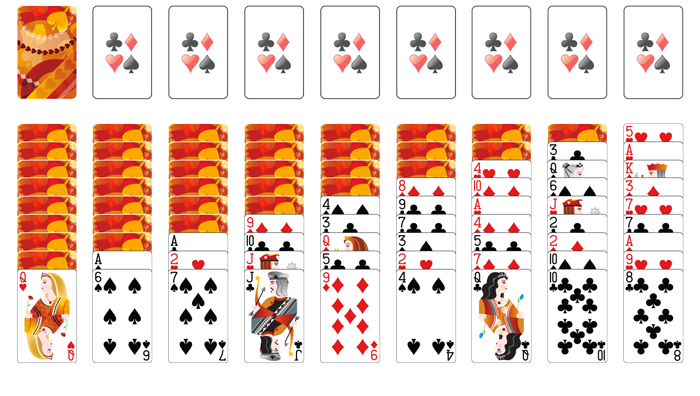This solitaire game is basically an easier variation of 4 suited Spider Solitaire. The cards in the piles already appear face up and there is no restriction when using the stock.
Group the cards in descending order and with the same suit (from King to Ace). The game ends when 8 of these groups are formed.
Beetle Solitaire is a variation of Spider Solitaire. The games are different due to two features that make this game easier than the original version. While in Spider Solitaire, at the beginning of the game, only the top cards of the piles appear face up, in Beetle Solitaire all the cards in the piles already appear face up.
Moreover, in Spider Solitaire it is only possible to deal cards from the stock if there are no empty piles. While this rule does not exist in this solitaire game.
In addition, unlike Spider Solitaire, where it is possible to choose the type of game (1 suit, 2 suits or 4 suits), in Beetle Solitaire this is fixed (4 suits), as the game would be very easy if it were possible play with 1 or 2 suits.

Game similar to Spider Solitaire, but more strategic.

Simple Simon Solitaire is an easy game that is very similar to Spider Solitaire and Scorpion Solitaire.

A solitaire game that can be both relaxing and challenging.

Game in the same style as Scorpion Solitaire, only more difficult.
Solitaire, a game often seen as a simple diversion, holds within its ordered world a profound lesson in mindfulness and the art of delayed gratification. The solitary nature of the game encourages a player to be fully present in the moment, focusing on the cards, the possible moves, and the strategies to be employed. This singular concentration fosters a state of mindfulness, where external distractions fade away, allowing the player to engage in a form of active meditation. The rhythmic pattern of sorting and organizing the cards becomes a practice in patience and attentiveness, as one must remain aware of the present game state while also anticipating future moves. In this way, Solitaire trains the mind to be observant and deliberate, qualities that are essential for mindfulness.
Furthermore, Solitaire is not a game of instant rewards; it teaches players the value of delayed gratification. Unlike fast-paced games that offer immediate rewards and constant stimulation, Solitaire requires a player to work through the deck patiently, with the understanding that success may not be immediate. This pacing ensures that when victory comes, it is the result of persistence and the ability to delay the desire for an immediate outcome. In a world that often prioritizes instant gratification, Solitaire stands out as a bastion for the slower, more rewarding experience. It instills in players the understanding that some rewards are worth the wait, and that the satisfaction derived from achieving a goal is heightened by the effort and time invested in reaching it.
Solitaire, a game often associated with leisurely pastime, has found its place as a cogent tool in the arsenal for promoting elderly brain health. As individuals age, the importance of maintaining cognitive agility becomes paramount, and Solitaire offers a readily accessible means to engage the brain in a range of mental exercises. The game's requirement for pattern recognition, strategic planning, and memory recall exercises key areas of the brain involved in cognitive preservation. Regular engagement in Solitaire can help older adults keep their minds sharp, potentially staving off the cognitive decline that can accompany aging. It's not just about moving cards, but rather about stimulating neural pathways, enhancing mental speed, and preserving the brain's plasticity, which are crucial for sustaining a high quality of cognitive function in the later years of life.
Moreover, Solitaire's inherent flexibility as a game that can be played both traditionally with cards or digitally on various devices adds to its appeal for the elderly, offering a comfortable and familiar interface to engage with technology. This intersection of traditional game mechanics with modern technology not only bridges generational gaps but also encourages a form of mental training that is both effective and enjoyable. The simplicity of Solitaire, requiring no complex rules or physical exertion, makes it an ideal brain exercise for the elderly, providing a gentle yet effective workout for the mind. By regularly arranging decks, sequencing suits, and solving layouts, elderly players can sharpen their mental faculties, potentially enhancing their daily functioning and prolonging their cognitive health.